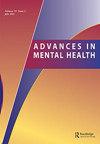Outcome and efficacy expectation for mental health promotion behaviours: the effects of predicting behaviours and variations in demographics
IF 1.4
Q3 PSYCHIATRY
引用次数: 2
Abstract
ABSTRACT Objective This study examines the reliability and validity of the scale for outcome expectations (OE) and efficacy expectations (EE), two especially critical variables for predicting mental health promotion behaviour. Further, the relation between the two types of expectation and mental health promotion behaviour and whether these expectations varied according to changes in demographics were tested. Method An online, cross-sectional study was conducted with 2485 participants in Japan. Participants were asked about demographic characteristics, OE, EE and current practices of mental health promotion behaviours. Results Confirmatory factor analysis showed reliability and validity in both OE and EE. Further, the relation between the two types of expectation and mental health promotion behaviour was confirmed. Both OE (path coefficient = 0.18, p < 0.01) and EE (path coefficient = 0.62, p < 0.01) were associated with mental health promotion behaviour. Among variations in demographic characteristics of participants, small to medium effect sized generation gap of expectancy was found (OE: f = 0.13, p < 0.01; EE: f = 0.20, p < 0.01). Discussion The present study demonstrates the potential for determinant roles of OE and EE for mental health promotion behaviours. These findings may encourage mental health promotion behaviours for individuals from any demographic background.心理健康促进行为的结果和疗效预期:预测行为和人口统计学变化的影响
摘要目的本研究检验结果期望(OE)和疗效期望(EE)量表的信度和效度,这是预测心理健康促进行为的两个关键变量。此外,还测试了两种期望与心理健康促进行为之间的关系,以及这些期望是否会随着人口统计学的变化而变化。方法对日本2485名参与者进行在线横断面研究。参与者被问及人口统计学特征、OE、EE和目前心理健康促进行为的做法。结果验证性因子分析结果显示OE和EE量表均具有信度和效度。进一步证实了两种期望与心理健康促进行为之间的关系。OE(通径系数= 0.18,p < 0.01)和EE(通径系数= 0.62,p < 0.01)均与心理健康促进行为相关。在参与者人口统计学特征的变化中,发现了小到中等效应的预期代沟(OE: f = 0.13, p < 0.01;EE: f = 0.20, p < 0.01)。本研究证明了情感表达和情感表达对心理健康促进行为的决定作用。这些发现可能鼓励来自任何人口统计背景的个人采取促进心理健康的行为。
本文章由计算机程序翻译,如有差异,请以英文原文为准。
求助全文
约1分钟内获得全文
求助全文

 求助内容:
求助内容: 应助结果提醒方式:
应助结果提醒方式:


